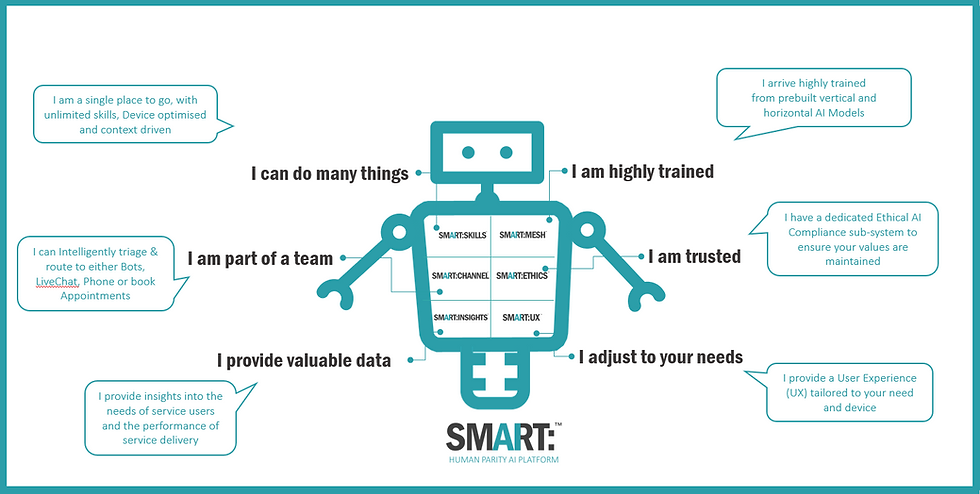Can AI achieve human parity? And why do so many chatbots fail?
- ICS AI
- Dec 15, 2021
- 3 min read
Updated: Sep 15, 2022
Can AI be as smart as humans? Probably not, at least not for now. As Microsoft's senior principal researcher, Kate Crawford, recently said "AI is neither artificial nor intelligent. It is made from natural resources, and it is people who are performing the tasks to make the systems appear autonomous". But, in a practical sense, we need artificial intelligence (AI) to perform a specific range of tasks as well or better than an average human does doing the same job.
When we look at how AI can transform everyday business operations, the benefits are very tangible. Automated, scalable, available every hour of the day, with rich analytics reporting and ever improving. And yet users still find chatbots frustrating. They often assume only other human can solve their problems. Why is that?
Well, most chatbots on the market cannot answer complex questions. They come in empty and rarely gather data to feed to agents, drawing out the interaction unnecessarily.
So, how to recognise AI assistants that can actually do the job for humans, releasing capacity and making a difference for both the organisation and end-customer?
Most chatbots on the market are frustrating and cannot answer complex questions. They come in empty and rarely gather data to feed to agents, drawing out the interaction unnecessarily.
Are they pre-trained?
AI is only as good as its training; most chatbots come with no knowledge. A chatbot is beneficial to the organisation only when it comes pretrained with thousands of queries and hundreds of sector-relevant topics, ready to answer unlimited questions instantly.
Can they learn and evolve?
Just as employees, chatbots need to get up to speed with updates, changes and emerging problems with the organisation. And they never learn by themselves, depending on the data and effort the organisation puts in their training. With properly designed technology, AI assistants can learn from their own performance, but also from numerous AI assistants working in their network, increasing the speed of knowledge acquisition and anticipating emerging trends, transforming into a real aid to human employees.
Are they trustworthy?
Most AI vendors on the market don't view ethical compliance as a priority in the building process. For AI to work hand in hand with people, it needs a sophisticated ethical compliance subsystem. When this is taken care of, AI risks are eliminated, trust established, and AI engages ethically with customers. The issue is, this is by no means an easy process – it often takes years of research, training and development to be able to provide AI that will fit into the complexity of human interactions.
What's special about human parity?
Agents answer contact centre questions at around 84% accuracy. What this means is that 16 questions out of a hundred are not answered correctly or need to be followed up with. AI with human parity performance has been proven to supersede these results - answering over 90% of questions correctly.
We all love good results. But human parity is about more than accurate answers. When AI provides a quality engagement, similar to the one with a human, that's when we know we are dealing with a sophisticated piece of technology.
So, when does AI reach human parity performance?
PRACTICAL
For a chatbot to offer an alternative to human engagement it cannot only answer simple questions. It needs to offer accurate answers to complex queries, recognise context and sensitive content and assist with end-to-end transactions in one place.
VERSATILE
A chatbot that's just a chat is not enough. To make a change in how the organisation works, you need an AI that can be deployed via different channels: website, phone, social media, email, live chat. This way, wherever the customer is looking for answers, they'll get them.
USER FRIENDLY
For any technology to make a difference in an organisation, people need to want to use it. Digital by default means, customers prefer to engage digitally, and performance metrics improve, freeing resources and saving cost. That's when human parity AI assistants can really shine - they are easy to use for people with different capabilities and without any additional software or training required.

Our AI Assistants are uniquely fit for the modern digital shift. Easy to use, WCAG 2.1 complaint, pretrained in 100,000+ queries, they achieve human parity, taking your customer service to the next level.
We believe in ethical AI. Trusted technology that works hand in hand with people creating better futures. For 5 years, we've work tirelessly so that you can have it. As an innovative company, we know how hard it is to earn trust. Now, we want to earn yours.




Comments